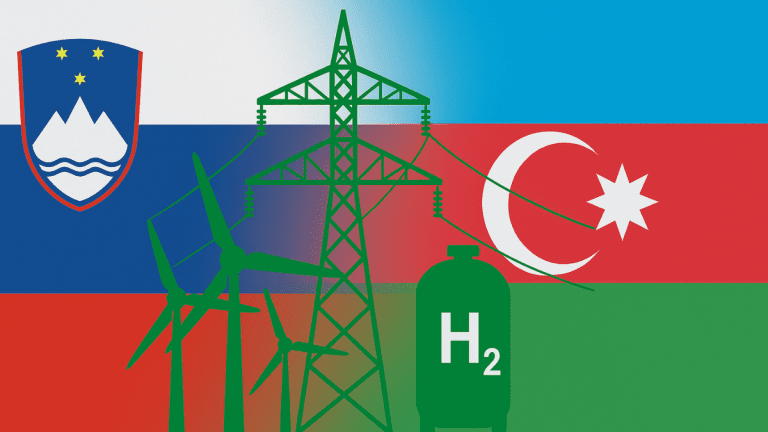
🕒 Last updated on August 2, 2025
Slovenia is stepping up efforts to meet Europe’s energy goals by partnering with Azerbaijan, a country rich in renewable energy potential.
Slovenia Supports Green Power Link Between South Caucasus and Europe
A big part of this partnership is the Black Sea Energy submarine cable project, which will bring green electricity from the South Caucasus to Europe.
The Slovenian Ministry of Environment, Climate, and Energy recently confirmed the country’s strong support for the cable project. This project will carry up to 4 gigawatts of clean energy through a 1,155-kilometer high-voltage cable under the Black Sea. Azerbaijani wind farms will provide the majority of the electricity.
This move supports Europe’s energy diversification strategy. It means Europe won’t rely so much on a single energy source or country. Instead, it will have more choices, especially in clean and green electricity.
In 2022, a cooperative agreement between Azerbaijan, Georgia, Romania, and Hungary marked the start of the Black Sea cable project. Later, Bulgaria also joined the initiative. To make this plan a reality, the energy operators of these countries formed a company called Green Energy Corridor (GECO) Power Company in 2024.
🧱 Finland builds world’s largest sand battery — and it’s heating homes without oil or pollution
Each of the five countries has an equal role in the company. This ensures fair and balanced cooperation as the cable project moves forward. The cable will also carry a fiber-optic communication line, making it even more useful.
A technical study by the Italian company CESI confirmed the plan is safe and economically smart. The project is also part of the ENTSO-E’s 2024–2034 network development plan, which highlights important European energy goals.
Clean Energy and Hydrogen Are Key Areas of Cooperation
Slovenia is not just supporting the cable project—it is also exploring ways to join in directly. One of the top goals is to work closely with Azerbaijan in the field of renewable energy technologies.
On April 4, 2025, the energy ministries of Slovenia and Azerbaijan signed a Memorandum of Understanding. This agreement focuses on clean energy development, green technologies, and joint innovation projects.
One of the most exciting areas is hydrogen energy. Hydrogen can be used to store and supply clean power when the sun isn’t shining or the wind isn’t blowing. Companies in Slovenia have extensive experience with smart grids, energy storage, and hydrogen systems. These companies are ready to share their know-how with Azerbaijan.
🌊 Freshwater Vanishing at Alarming Speed — Four Mega-Regions Face Collapse
The ministry also said that research groups from Slovenia are encouraged to work together with Azerbaijani institutions. This can lead to new ideas and solutions for clean energy systems.
The Slovenian government is also happy about Azerbaijan’s efforts to become a clean energy leader. This includes hosting the upcoming COP29 climate conference, where countries around the world will discuss how to protect the planet.
Natural Gas Deal Adds Another Layer to Energy Partnership
While clean energy is a major focus, natural gas cooperation between Slovenia and Azerbaijan is also growing fast. Slovenia sees Azerbaijan as a reliable gas partner, especially as Europe looks for alternatives to traditional gas suppliers.
Slovenia began receiving natural gas from SOCAR, the national oil corporation of Azerbaijan, in August 2024. This is done through the Trans-Adriatic Pipeline, a key part of the Southern Gas Corridor that connects gas fields in the Caspian Sea to Europe.
The gas deal came after a memorandum between SOCAR and Slovenia’s largest gas company, Geoplin, was signed in July 2024. By the end of 2024, Azerbaijani gas made up around 5% of Slovenia’s total gas use. Talks are ongoing to increase this amount.
🔥 First oil pact, now tariff punch — why the U.S. is still taxing Pakistan’s goods
Slovenia’s total yearly gas demand is about 0.8 to 1 billion cubic meters. The new gas supply from Azerbaijan makes a big difference in helping Slovenia meet its needs without relying too much on other countries.
Officials from Slovenia’s energy ministry noted that this is the strongest energy partnership the two countries have ever had. The April 2025 agreement between the two governments also supports further cooperation on both natural gas and clean energy, making the relationship even stronger.
The European ambition to transition to cleaner, more secure energy sources is a wonderful fit for this collaboration. Through partnerships like this, Slovenia is helping the European Union diversify energy supply routes while moving toward a greener future.